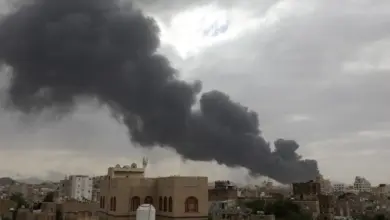Sanaa — Members of Al-Qaeda, the international terrorist network headed by Osama bin Laden prior to his killing by US commandoes in Pakistan this month, are expanding their influence in southern Yemeni provinces Shabwa and Abyan, local leaders say.
As demonstrations and violence continue to rack the country, and political upheaval in Yemen shows no signs of abating after President Ali Abdullah Saleh declined to endorse a Gulf-brokered plan designed to oust him from office, provincial Yemen is increasingly lawless and Yemenis are welcoming Al-Qaeda’s presence.
The group's operatives are working side by side with locals to protect roads, man checkpoints and regulate traffic.
Sheikh Hussein Bin Othiman, the head of the Shabwa coalition aimed at expelling Al-Qeada in the province, says local sheikhs are coordinating with the organization to designate checkpoints. Despite previously pledging the coalition effectively removed Al-Qaeda from the region, Bin Othiman says the organization now mans four checkpoints in Shabwa’s Mahfad district. Bin Othiman says Al-Qaeda gained local support and trust by curbing tribal banditry in the region.
“They [Al-Qaeda] made it safe,” said the sheikh. “They act nice and distribute books to the locals.“
Bin Othiman says Al-Qaeda in the region is divided into two factions. One branch is affiliated with the umbrella group that spans countries and continents. The other is sponsored by Saleh’s regime.
“Those who distribute good Islamic books that encourage good manners are part of bin Laden’s Al-Qaeda,” said Bin Othiman. “They aren’t any danger to anyone. They protect the roads and the locals. The regimes’ Al-Qeada is found to kill locals.”
The sheikh says the tribes are fully capable of ousting the organization from the area but permit them to stay. Bin Othiman claims the group is not active in the town of Habban, one place where the coalition he heads still controls local security.
“The coalition won’t accept any of them in our area at all,” he said. “Our area is insured by the tribes.”
“They [Al-Qaeda] are only 40 members while we are around 40,000. After a boy reaches 12 years old, we train him with weapons. We don’t fear them.”
Rashad Abu al-Feda, a leading member of Al-Qaeda in the Arabian Peninsula (AQAP), says the withdrawal of Saleh-affiliated security forces in the southern governorates enabled Al-Qaeda to emerge and interact with the local community. Al-Qaeda members in the region claim they are committed to non-violent political pressure.
"No one of us chose Jihad from the beginning,” al-Feda told Al-Masry Al-Youm. “That happened only after trying all peaceful means to gain our rights."
“The revolution is a healthy phenomenon that is a result of injustice and tyranny for so many decades,” he added. “It’s an expansion of jihadist calls to expose this regime.”
Al-Feda vows Al-Qaeda will endorse any national government deriving from the political crisis in Yemen that will respect Islam. The group, al-Feda says, even wants to form a partnership with such a regime. The Al-Qaeda leader also dismissed suggestions the current government supports a branch of the group. The regime, al-Feda says, is the target of Al-Qaeda for its oppressive policies towards Yemenis and its collusion with the US.
“The regime opened Abyan’s air space for the US to target locals,” said al-Feda. “The regime is fighting Al-Qeada to gain US financial and political support.”
A local Shabwa sheikh, who requested anonymity due to the sensitive nature of the issue, says the Saleh regime, in reality, doesn’t want to attack Al-Qeada at all.
“Al-Qaeda exists in public now,” he said. “Why don’t the drones target their places? They target places other than the known ones.”
Political analyst Abd al-Hakem Helal warns US drones, unmanned aircrafts that strike targets in Yemen and claim civilian casualties, encourage sympathy in Yemen for the militant Islamist group.
”Saleh wants to prove that he needs to fight Al-Qeada to gain US support,” said Helal. “We have information that he will also allow them [the US] to send ground troops without a declared agreement.“
Ahmed al-Zurqa, a political analyst specializing in AQAP affairs, recently told the Yemen Times, a newspaper based in the capital Sanaa, affiliation with Saleh is possible but Al-Qaeda members will never admit, even if they were able to, they are collaborating with the regime.
“AQAP is not organized like a political party. It’s a cluster system with each cell apart from the other. No one knows the others leaders so they can’t assure that the regime doesn’t support other AQAP cells,” said al-Zurqa. ”AQAP would deny any relationships with the regime but we have information that confirms that.”
Al-Zurqa says that relationship is evidenced by Al-Qaeda free mobility and the lack of security surveillance. He also claims a successful revolution that accomplishes Saleh’s ouster will indirectly force the withdrawal of Al-Qaeda, as well.
“Al-Qaeda benefits from the civil wars, military conflicts and security vacuum,” al-Zurqa said. “The sooner the regime leaves and the security bodies and society become coherent, the sooner there will be an end to Al-Qeada.”
The group is suspected of setting off an explosion in a marketplace in the Abyan town Zinjibar last week that killed nine Yemenis, including five soldiers.



